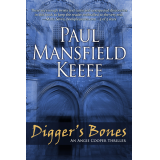His eyes, blue as the reflected sky, gleamed of the unknown. They fell away . . . down, down, down, seemingly forever. His hand reached out. Terror flamed in his eyes. His eyes!
A scream choked in her throat. She sat up, breathing heavily, her sheets soaking wet, her heart beating like a war drum, as she woke from her recurring nightmare. So many nights she woke to those eyes, her father’s eyes, staring at her through night’s darkness. She wept.
Angie’s father left her and her mom to fend for themselves when she was only a small child. It hadn’t been easy. Her mother had never quite gotten over the accident. Everything in her mom’s life had been planned to evoke a feeling of his still being there, still in their lives. Nothing in their home had changed over the years, not the furniture, not the artwork, everything still in its proper place.
Angie wasn’t that different. Her father was a well respected archaeologist, and Angie followed right in his footsteps. Deep down inside she felt like she owed it to him to continue his legacy. But her failure at Hoi Oidak put a halt to that. She had failed him, she was guilt ridden, and the nightmares grew in strength.
After a nightmare such as that, she wouldn’t easily get back to sleep. She rummaged around in her purse and pulled out an old weathered photograph. Happiness played in her parents’ eyes. The photo was taken at a dig in Jerusalem at the Tower of David; she standing with her hand on his shoulder, he seated, reaching up to lightly clasp her finger tips. They weren’t much older than Angie was now.
A distant memory flashed before her, her father smiling brightly, laughing loudly. She could still recall herself in the backyard, five years old, digging with her pail and shovel, her father, squatting down, asking, “What are you doing, honey?” She looked up from her work and answered, “Digging for bones.” She touched the photo, sighing.
Putting the photo away she got up and quietly made her way to Dr. Lausen’s living room. Reilly was fast asleep on the couch, a pool of drool on his pillow. Angie, against every fiber of her being, found it cute and looked at him affectionately.
A good book, she felt, might help her fall back to sleep, or at least keep her entertained. Picking up her Sue Grafton novel she had picked up at the airport, she opened to the third chapter. Realizing she was just too depressed to read she put it back on the end table. The memory of Digger was only a heartbeat away and pictures of him flooded back into her consciousness.
If he were here, he would know what to say to cheer her up.
But, like her father, he wasn’t here. And he would never be here again. He was only a memory, fading with every hour, a ghost in her awareness. She missed him deeply. The memory of the CityZen shot into her mind like a bullet from the killer’s gun. Gasping out loud, she pictured Digger’s head falling to the side. Tears poured from her and she muffled her sobs with her hands.
One bad memory leaped to another and she found herself back at Hoi Oidak, fingers pointing at her, friends turning their backs. She cried harder, this time for herself. Then she saw Digger in her mind’s eye cursing out reporters, telling off PhDs, and tearing into anyone that looked at Angie cross-eyed. She found herself smiling through the tears. He really was like family, her truest friend. And now he was gone and she had lost her touchstone to the past.
Then she remembered Reilly turning his back on her when she needed him most. She had given so much to him. She would have given up everything and moved down to Tennessee with him. She would have gladly worked as a waitress, forgoing her own career, if it meant they could have been together. She loved him and wanted nothing more than to make him happy—to be a family. And he turned his back on her. Anguish overwhelmed her and she kicked the sleeping Reilly hard.
“Ow! What the hell?” Reilly shouted, almost falling off the couch.
“Oh, sorry,” she said dryly, “I had a cramp.”
She got up and went off to the bathroom to take a shower before going for a morning jog. It was the only relief she could hope for from the onslaught of such dreadful memories. Running always helped to clear her head. There was just enough time for a quick run before they left for Israel.
Once showered and dressed, Angie made her way down Ferry Landing Road, headed for Old Mt. Vernon Road, on a short one mile run.
She ran track and field in high school and college and simply loved it. At Columbia, she ran the 400m but was nearly always dead last. Her teammates didn’t seem to care, they were just glad that she gave it her all. Besides, none of them were of Olympic caliber; they ran for the love of the sport.
Willows wept sadly upon the ground as she ran. Images of her college friends flipped through her head like photos in an album, stopping on Digger. She had to sit on a curb for awhile to hold back her tears. The harsh reality of losing her best friend tore at her and she realized she may never get over his death.
Digger was the one guy that had always been there for her, the one person that stood up for her in Hoi Oidak. A reporter for Scientific American asked him how his colleague could have made such a momentous mistake. Digger read him the riot act. He went too far, as anger pushed him beyond common sense. He said Dr. Lausen was a fool if he didn’t listen to Angie. That she was ten times the archaeologist of any of them, and other such outrageous claims. He soon lost face as Angie’s ship began to sink, drawing him down with her.
She claimed it was all her fault, of course, trying her best to protect the others caught in her wake. But Digger had said awful things about Lausen and soon found himself jobless. As luck would have it, Professor Rothschild had been looking for someone and had previously spoken with Digger about joining his team. Digger asked the professor how he felt about what happened between himself and Dr. Lausen, Rothschild answered with a typical “c’est la vie.”
Soon her thoughts strayed to another important person from her college days, Reilly. He was probably the reason she stuck with running in college. After all she had a busy academic schedule. But she got to run with Jack Reilly five days a week, so she made time. Now Reilly had come back into her life as suddenly as he had left it. It was true that she was the one that shut him out, but the emotions felt the same. He was back and he moved her in those same nearly forgotten, or at least denied, ways.
But she was angry with him. Even though three years had passed since the incident, she just couldn’t let it go. He had abandoned her. He could have stood up for her, but he wasn’t willing to take the risk. When the chips fell on Hoi Oidak, he threw his in with the others. He claimed Angie wasn’t cautious enough and that they had all told her to slow down. He had not. The others had, but not Reilly, at least not to her face. She remembered what he had said to her. “Ang, you know what you’re doing. Go for it.” She did, and it cost her everything.
Yet, it was her fault; there was no use in denying it. How could she blame him for wanting to protect his career? After all, she was the one who told the press the others didn’t agree with her findings—an obvious lie after Digger’s tirade with the reporter. So, Reilly had stuck with the story, keeping himself at arm’s length from her. So what? Could she really blame him? After all, it was her mistake, not his. She was the one that had let them down with her rush to publish. With her overwhelming need for recognition.
Idiot, she thought, mouthing the word. She got up and continued her run, noticing just how out of shape she had let herself become.
And now Jack Reilly was back and it felt as if he had never left, and when she looked into his eyes, all the days between simply washed away like a hard rain in a desert gully. She was back in Tennessee, talking with his mom while they cooked up some wonderful southern meal. Staring out into the backyard, watching the two men, Jack and his dad, smoking cigars and pretending like they didn’t know the woman were watching them. She missed those days more than ever. The life she knew she was meant to live. A life she was ready to live now.
But mostly she missed Reilly. The intense chemistry between them just couldn’t be denied. It burned deep within her.
As she rounded the final corner of her run, and Dr. Lausen’s house came back into view, she made her decision. She would forgive Jack Reilly. She would forgive herself. And she would convince Jack Reilly that he couldn’t live without her.








